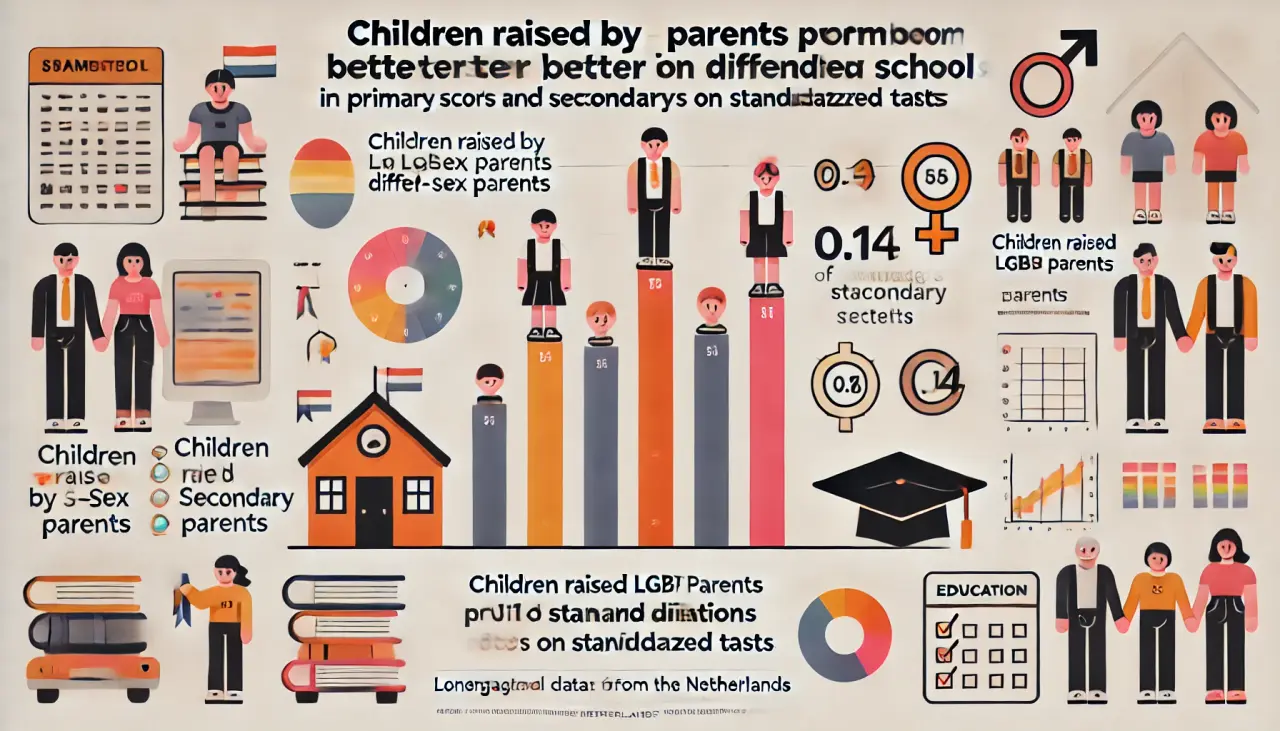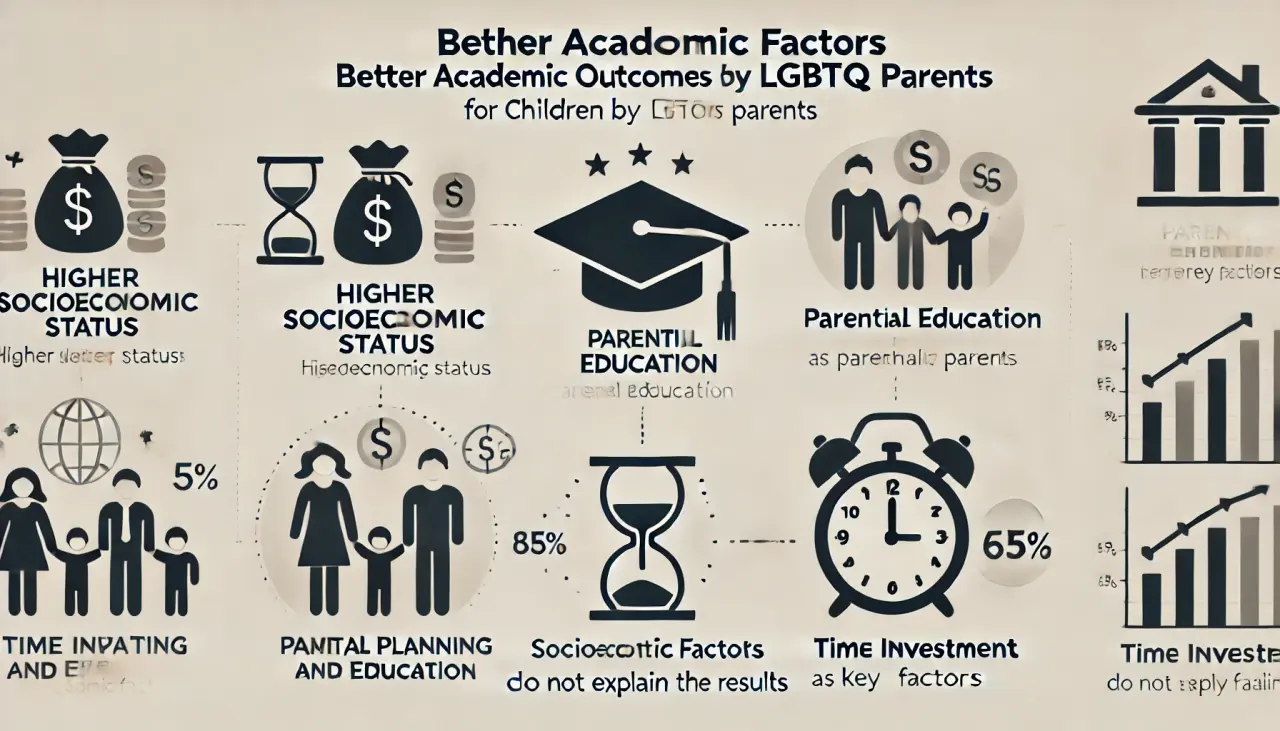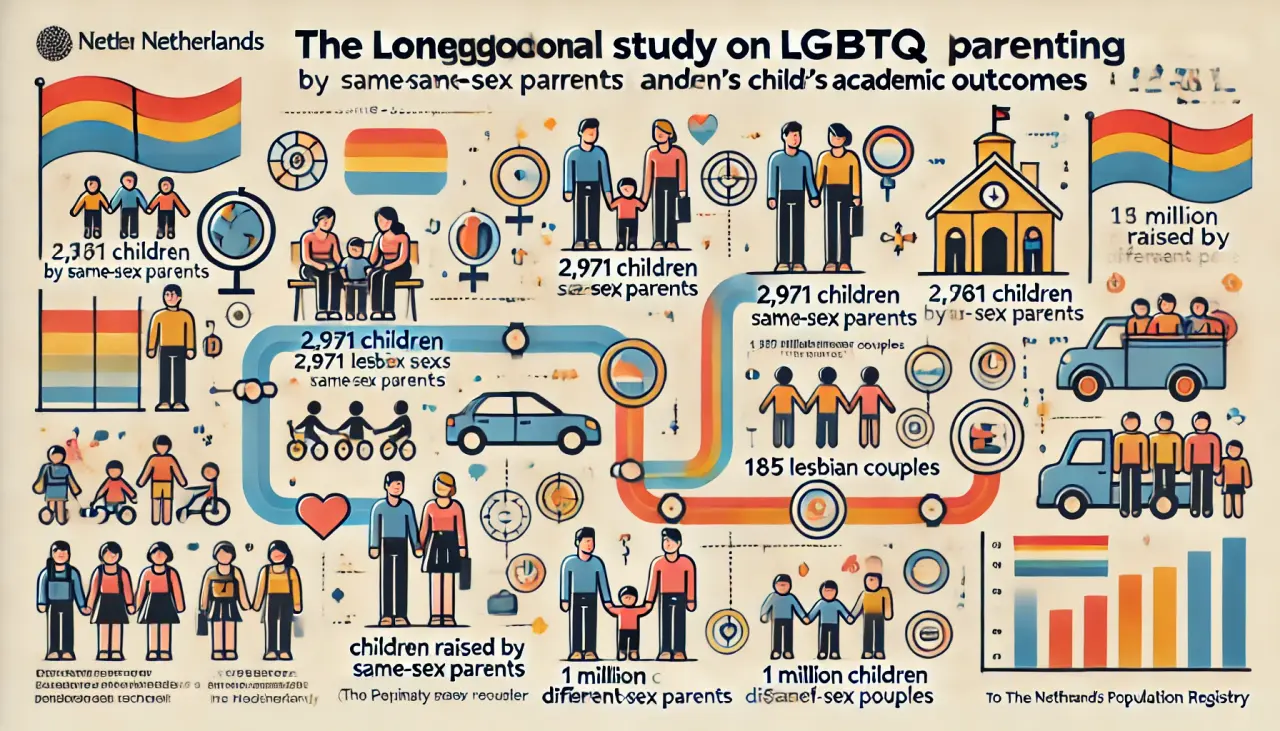
The Impact of LGBTQ Parenting on Children’s Academic Performance: A Comparison with Heterosexual Families
Despite its widespread use in policy debates, the literature on outcomes for children raised by same-sex parents often relies on small, selective samples or cross-sectional survey data. This has resulted in a lack of statistical power and challenges in distinguishing between children born to same-sex parents and those raised in separated heterosexual families. To address these issues, we utilize unique longitudinal administrative data from the Netherlands, the first country to legalize same-sex marriage. This dataset includes 2,971 children raised by same-sex parents (2,786 children raised by lesbian couples and 185 children raised by gay male couples) as well as over one million children followed from birth by different-sex parents.
Academic Performance of Children Raised by LGBTQ Parents
Our results indicate that children raised by same-sex parents from birth perform better in both primary and secondary education compared to children raised by different-sex parents. The findings remain robust even when using fixed-effects models and precise matching techniques to improve covariate balance and reduce model dependence. Further analysis using a novel boundary estimator suggests that the selection on unobserved characteristics would need to be three times stronger than the selection on observed characteristics in order to nullify the positive estimates.

Objections and Concerns Regarding Same-Sex Parenting
Marriage equality was a significant victory for LGBTQ rights advocates in the United States. On June 26, 2015, the U.S. Supreme Court legalized same-sex marriage across all 50 states, ending a decades-long legal struggle (Obergefell v. Hodges, 2015). Opponents of same-sex marriage, however, have raised concerns about the potential negative effects of same-sex parenting on children, arguing that it undermines the institution of the family (McVeigh & Diaz, 2009).
For instance, Stone (2019) found that from 2000 onwards, opposition campaigners’ central message was that “children do better in families with both a mother and a father.” While attitudes toward LGBTQ rights have become more liberal, many Americans remain uncertain about the consequences of marriage equality for children raised by same-sex parents. A 2019 survey by the Pew Research Center found that 31% of U.S. adults opposed same-sex marriage.
Data Sources for Research on LGBTQ Parents Raising Children
In this article, we use unique longitudinal data from the Netherlands, which was the first country to legalize same-sex marriage, to explore the outcomes of children raised by same-sex parents. The Netherlands provides an ideal context for empirically assessing outcomes because we can examine a country where same-sex marriage has been legal for nearly two decades.
Since 2001, same-sex couples have been able to formalize their relationship through marriage, and since 1998, they have been able to do so through registered partnerships. This allows us to compare the educational outcomes of children raised by same-sex parents with those raised by different-sex parents.
Much of the existing literature on same-sex parenting relies on small convenience samples or cross-sectional data (Allen, 2015; Manning, Fettro, and Lamidi, 2014; Stacey & Biblarz, 2001). Such small-scale, convenience samples lack statistical power and may produce biased conclusions. Cross-sectional studies also fail to determine whether children were actually raised by same-sex parents from birth or whether they lived with same-sex couples after parental separation.
Our longitudinal data includes children born between 1998 and 2007, whose educational performance can be tracked until 2019. This allows us to study the academic performance of 2,971 children raised by same-sex parents (2,786 children raised by lesbian couples and 185 children raised by gay male couples) and over one million children raised by different-sex parents, from birth to the end of primary school. We track about one-third of these children until the end of secondary school, which also allows us to examine high school graduation rates.
A key contribution of our analysis is that we can distinguish between children raised by same-sex parents from birth and those who were raised in different-sex relationships before living with same-sex couples later in life. To our knowledge, this is the first study to examine the academic performance of children raised by same-sex parents from birth (rather than those who joined same-sex families later in life) using a large, representative sample.
However, it is important to note that the administrative data does not directly measure sexual orientation. We define same-sex parents based on detailed family information from the Netherlands’ population registry. As such, our study focuses solely on couple-based families, as we cannot determine whether single parents are identified as LGBTQ.

Children Raised by LGBTQ Parents Perform Better Than Those Raised by Heterosexual Parents
Our results show that children raised by same-sex parents from birth perform better on standardized tests at the end of primary school compared to those raised by different-sex parents, with an advantage of approximately 0.14 standard deviations. In contrast, children who later lived with same-sex parents perform somewhat worse than those raised by heterosexual parents (though the difference is not significant), which may be due to the negative effects of parental separation (see McLanahan, Tach, and Schneider, 2013).
We also found that children raised by same-sex parents continue to outperform those raised by different-sex parents in secondary school. Specifically, children raised by same-sex parents from birth are more likely to graduate from high school compared to those raised by different-sex parents. We did not observe any heterogeneity based on child gender, race, or parental marital status. Similarly, we found no heterogeneity based on the gender of parents, though our sample of gay male parents is too small to draw any strong conclusions.
Our results largely support the hypothesis that same-sex couples tend to have higher socioeconomic status, which may contribute to better academic outcomes for their children, given the time and effort involved in having children through same-sex parenting methods.
However, even when we control for a range of socioeconomic factors, the significant positive correlation between same-sex parenting and better academic outcomes does not disappear entirely. Using a new constraint estimator developed by Oster (2019), we find that the selection on unobserved characteristics—such as parents’ motivation and pre-childbirth family planning—would need to be more than three times stronger than selection on observed characteristics like parents’ education and income in order to reduce the positive correlation to zero.
Conclusion
In conclusion, our findings suggest that children raised by same-sex parents are likely to perform at least as well as, if not better than, children raised by different-sex parents in terms of academic achievement.